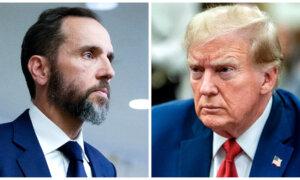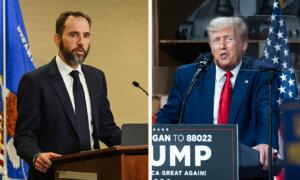The questionnaire would be administered to prospective jurors in the case alleging the former president improperly handled classified documents.
The prosecutors and defendants have disagreed on several of the questions that should be asked, but the list has not yet been made public. The prosecutors argued it should be filed under seal until after jury selection, while defendants argue it should not be filed under seal, making it publicly accessible.
If the judge grants the special counsel’s request, the questionnaire would still be made public after the jury has been selected.
Prosecutors argue that revealing the questions in a highly publicized case such as this one would be akin to giving out the answers before a test.
“As a matter of common sense, assessing unrehearsed responses to questions is an ineffective manner to evaluate each potential juror’s impartiality,” the motion reads.
They add that prospective jurors may well have strong opinions about the defendants or prosecutors, and rehearse and tailor their answers.
“Potential jurors may have strong views about Trump, his co-defendants, or the Government in this case, and providing advance information about the contents of the questionnaire increases the risk that potential jurors may craft their answers to increase their odds of serving or avoiding service on the jury,” they argued.
The media attention given to this case only compounds the likelihood that prospective jurors may see the questions they would be asked “along with advice or instructions as to how the questions should be answered,” prosecutors argued.
The prosecutors also want the discussion surrounding the jury questionnaire to be sealed.
“The media’s attention to and scrutiny of that process risks amplifying the harms addressed above and improperly influencing potential jurors’ questionnaire responses, thereby hindering the Court’s assessment of impartiality,” the motion reads.
The case, overseen by U.S. District Judge Aileen Cannon, is set for a May 20 trial date and the parties have been filing several motions in past weeks to meet the speedy trial deadline.
Major Hearing This Week
On March 1, the parties have a scheduling conference with the judge, during which defendants are expected to demand more time to litigate pretrial motions, and prosecutors will explain whether they’ve met their discovery obligations.
The judge will then determine whether the May 20 trial date will be delayed.
In the accompanying order, the judge specified that the parties should be prepared to discuss a motion to compel the defendants filed back in January. Throughout the case, the defendants have argued that the prosecutors are not turning over documents requested, while prosecutors have argued that they have gone above and beyond to streamline discovery and any materials not delivered are ones they have no obligation to or no possession of.
The hearing is expected to be a lengthy one, with the judge separating out a morning and afternoon session to discuss various topics.
Also unresolved is the prosecution’s request to keep names of certain government officials redacted in a filing that was previously ordered unsealed. They have argued that to reveal the names would jeopardize the safety of several government witnesses.
The volume of classified information has complicated the case, the judge previously noted, and several hearings, meetings, and filings have been under seal. In a footnote, the judge added that the defendants have filed “an additional eight substantive pretrial motions” in the past week under seal, and three of those include requests for additional hearings.
The judge ordered the parties to bring relevant caselaw to argue these pending motions.
Original News Source Link – Epoch Times
Running For Office? Conservative Campaign Consulting – Election Day Strategies!


